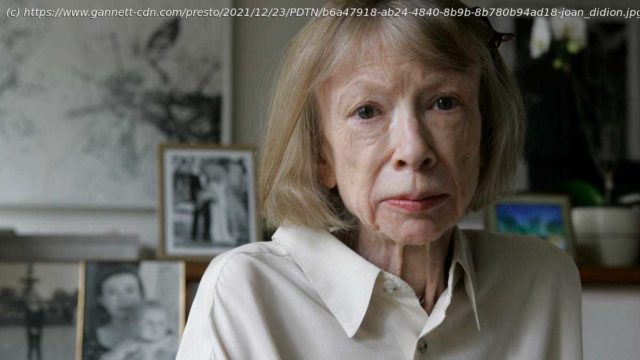Didion reigned in the pantheon of “New Journalists” who emerged in the 1960s and wedded literary style to nonfiction reporting.
New York — Joan Didion, the revered author and essayist whose precise social and personal commentary in such classics as “The White Album” and “The Year of Magical Thinking” made her a uniquely clear-eyed critic of turbulent times, has died. She was 87. Didion’s publisher Penguin Random House announced the author’s death on Thursday. She died from complications from Parkinson’s disease, the company said. “Didion was one of the country’s most trenchant writers and astute observers. Her best-selling works of fiction, commentary, and memoir have received numerous honors and are considered modern classics,” Penguin Random House said in a statement. Along with Tom Wolfe, Nora Ephron and Gay Talese, Didion reigned in the pantheon of “New Journalists” who emerged in the 1960s and wedded literary style to nonfiction reporting. Tiny and frail even as a young woman, with large, sad eyes often hidden behind sun glasses and a soft, deliberate style of speaking, she was a novelist, playwright and essayist who once observed that “I am so physically small, so temperamentally unobtrusive, and so neurotically inarticulate that people tend to forget that my presence runs counter to their best interests.” Or, as she more famously put it: “Writers are always selling somebody out.” Didion received a National Humanities Medal in 2012, when she was praised for devoting “her life to noticing things other people strive not to see.” For decades, she had engaged in the cool and ruthless dissection of politics and culture, from hippies to presidential campaigns to the kidnapping of Patty Hearst, and for her distrust of official stories. “Slouching Towards Bethlehem,” “The White Album” and other books became essential collections of literary journalism, with notable writings including her takedown of Hollywood politics in “Good Citizens” and a prophetic dissent against the consensus that in 1989 five young Black and Latino men had raped a white jogger in Central Park (the men’s convictions were later overturned and they were freed from prison). Didion was equally unsparing about her own struggles. She was diagnosed in her 30s with multiple sclerosis and around the same time suffered a breakdown and checked into a psychiatric clinic in Santa Monica, California that diagnosed her worldview as “fundamentally pessimistic, fatalistic and depressive.” In her 70s, she reported on personal tragedy in the heartbreaking 2005 work, “The Year of Magical Thinking,” a narrative formed out of the chaos of grief that followed the death of her husband and writing partner, John Gregory Dunne.






